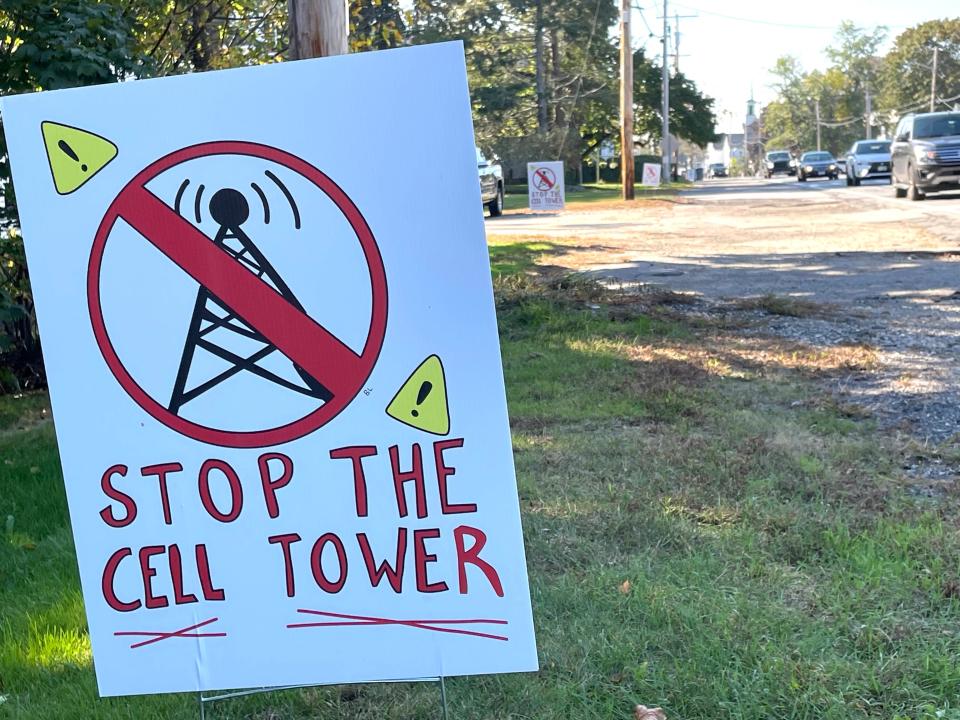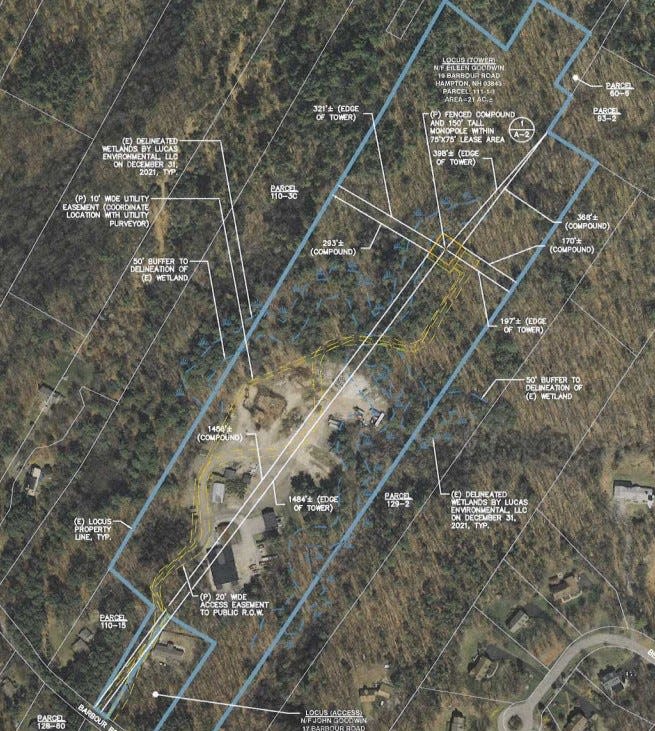Hampton ZBA stands firm on cell tower denial: Will Vertex sue town?
HAMPTON — The town’s Zoning Board voted unanimously Monday to reject a rehearing request from a company that wants to construct a 156-foot cell tower.
The board had previously denied granting a height variance to Vertex Towers for its proposed project on 17 and 17R Barbour Road on Jan. 10.

Bill O’Brien, chairman of the Hampton Zoning Board, said the Massachusetts company asked them to reconsider their decision. After consulting with the board’s attorney, O’Brien said to approve a rehearing the board had to believe that either there was new evidence to consider or that the board made a mistake in its initial decision.
O’Brien said he didn’t see any new evidence in the 14-page application filed by Vertex for a rehearing, nor did he believe the board erred in its denials.
The ZBA’s reason for the denial on Jan. 10 was based on the opinion of its hired consultants, IDK Communications, which indicated a 110-foot tower would be sufficiently high to meet the needs Vertex hoped to address with its new tower.

O’Brien said Monday that the consultant’s opinion was still the major reason he felt the height variance should be denied. In addition, O’Brien said real estate experts noted the 156-foot tower could be seen above the trees and would negatively impact the value of surrounding properties, something Vertex denied.
When O’Brien polled the other four ZBA members at the meeting, they agreed there was no new evidence and that their original decision was not flawed.
Last year, Vertex Towers applied to build the 150-foot tall monopole-style cell tower with a six-foot lightning rod.
The company’s representative, attorney Francis Parisi, told the board the tall tower was necessary to fill coverage gaps along portions of the Seacoast, and the site chosen was the only viable option left in town. Parisi also claimed establishing a tower of that size would have no impact on the value of private properties in the neighborhood.
Voters guide to the Hampton election: When, where, and who is on the ballot
Will Vertex Towers take case to federal court?
Parisi said Tuesday the company has not decided on its next steps in light of the Zoning Board refusing their rehearing request.
Asked if the company was considering either going to court or bringing in a new application for a shorter tower, Parisi said there were no opinions on those issues at this point in time.
Vertex, active throughout New England, has a history of filing lawsuits against communities that reject its proposals, citing the federal Telecommunications Act. Recently, it filed a suit against York, Maine’s Board of Appeals following its denial of a variance for a tower in a zone where they’re prohibited by a local ordinance. Vertex withdrew the suit after a federal magistrate recommended it be dismissed.
Vertex’s attorneys said at the time they withdrew because AT&T had applied to place a cellular antenna on top of a water tank in York. AT&T was granted approval for the water tank antenna.
'Kids deserve better': Why Seabrook wants to break up with SAU 21 over poor test scores
The Hampton tower was part of Vertex’s plan to erect two, 150-foot cell towers – one in Hampton and the other in North Hampton – to improve cell service and eliminate the dead zones that plague parts of the Seacoast east of I-95.
Last November, Vertex’s application was approved by the North Hampton Planning Board to build a 150-foot wireless tower, with access driveway and utility improvements, behind 142 Mill Road. The project was granted three zoning variances as town zoning requires all cell towers to be located west of Interstate 95 and on town-owned, and not private land.
Knowing that Vertex’s tower proposal was before the Hampton ZBA, Parisi was asked if both towers were required to improve cell service in North Hampton. Parisi said the towers could function separately and still improve service.
“They are two independent facilities nicely placed to provide complimentary coverage,” Parisi told the North Hampton Planning Board of the Mill Road and the proposed Barbour Road towers.
Vertex Towers is not itself a cell or wireless provider. It is a telecommunications infrastructure developer, which builds, manages and owns telecommunications facilities across the country, many across New England. After it builds towers, it contracts with wireless carriers – such as AT&T, T-Mobile and Verizon – to establish their antennae on its tower.
More: Al Fleury pulls plug on 94-unit apartment complex, hotel in downtown Hampton
This article originally appeared on Portsmouth Herald: Vertex Towers loses rehearing bid for 156-foot cell tower in Hampton

